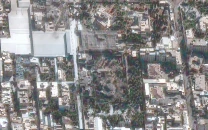Punishing doctors?
In such a morally obscure situation, punishments should always be used as a last resort

The Lahore High Court has been a bit strict in their decision to punish medical professionals taking part in periodical protests and sit-ins. While transferring those involved to far-flung areas — as suggested by the honourable court — may deter many, it might not be enough to end the culture of strikes in the medical profession. Instead, the situation could also backfire and lead to further hasty protests. It must be realised that in such a morally obscure situation, punishments should always be used as a last resort.
That the medical profession has no room for protests is only partially true as it is a characteristic of a true democracy to give a voice to all institutions in a regulated manner. However, doctors and nurses must consider that their profession gives little room for extended protests as real human lives are at stake. Such is the nature of their job and therefore emergency officials, in particular, must always be on duty as even a few minutes could mean life or death. On the flipside, the woes and concerns of doctors are legitimate and must be acknowledged. It is no secret that the healthcare structure of Pakistan is in a deplorable state. Major government hospitals across the country are not able to meet the needs of the population due to lack of resources and facilities and doctors have even voiced their concerns of not having enough for emergency wards. On the one hand, corruption and nepotism persist, and on the other it is impossible for a common man to seek treatment for prevalent diseases such as cancer.
Transferring a few professionals may not serve as a remedial measure. Instead, a middle ground needs to be sought. This can take the form of quarterly town hall meetings or through the initiation of a platform where doctors are able to voice out their concerns in a systematic manner which, in turn, are taken seriously by concerned officials.














COMMENTS
Comments are moderated and generally will be posted if they are on-topic and not abusive.
For more information, please see our Comments FAQ